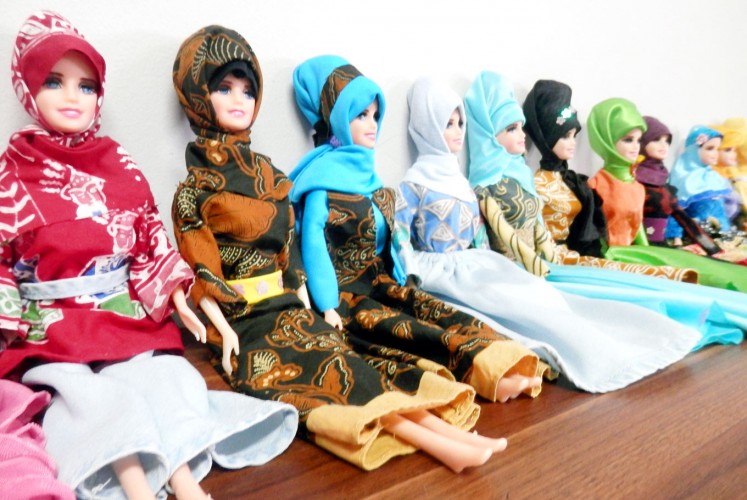Popular Reads
Top Results
Can't find what you're looking for?
View all search resultsPopular Reads
Top Results
Can't find what you're looking for?
View all search resultsLusia Kiroyan: Empowering female inmates through batik-wearing dolls
Social entrepreneur Lusia E. Kiroyan teams up with female inmates to promote Indonesia through dolls dressed in batik.
Change text size
Gift Premium Articles
to Anyone
I
f you like to collect Barbie dolls, you might know the hijabi Barbie-lookalike doll named Jenna that just turned into a hit for wearing an abaya robe, a modest couture dress and colorful headscarf.
Created by French businesswoman and mother Samira Amarir, Jenna followed the success of Hijarbie, a popular Instagram account owned by Nigerian scientist Haneefa Adam, which featured images of a hijab-wearing Barbie toy from Mattel.
Indonesia too has Barbie-like dolls and they are clad not only in hijab but also in batik, one of the country’s intangible cultural heritages.
Unlike Jenna, the Indonesian Barbie-lookalike dolls are created by female inmates who name their toys after themselves, such as Yanti and Widya. The brand of the batik-wearing dolls is Batik Girl that is masterminded by Lusia Efriani Kiroyan from Batam, Riau Islands.
Since setting up the Cinderella from Indonesia Center (CFIC) foundation in 2012, she has empowered over 740 female inmates at two penitentiaries in Riau Islands and one in Jakarta to make dolls with dresses made of used batik attire or fabrics.
“Through Facebook, I asked my friends to give me batik dresses they no longer wore,” the 37-year-old recently said in Jakarta.
Before making the dolls, the inmates were taught by Lusia to make snacks, such as biscuits and cookies with an expectation that they would be financially independent after serving their time.
The mother of two said 80 percent of the female inmates she helps at the penitentiaries are former drug addicts. For her, empowering them matters because she believes that they can be also heroes with skills that they have.
“I want to change these female inmates to be social entrepreneurs [after they walk free],” she said.
The idea to make Batik Girl popped up when she joined the International Visitor Leadership Program (IVLP) in the United States where her friends liked to call her a “doll from Indonesia” for her Barbie’s looks, — a tall girl with long hair, with batik dresses that she always wore.
Last year, she began to dress her toys with hijabs with a mission to echo the peaceful image of Islam in Indonesia, the world’s biggest Muslim-majority country.
Indonesian fashion: Barbie-lookalike dolls clad in batik dresses and hijabs. (Lusia Kiroyan/File)Every year, CFIC produces at least 2,000, each priced at US$15. The proceeds from its sales are used to finance the foundation’s charity programs, including the inmates’ salaries.
Lusia said her dolls were hard to sell in Indonesia, but they got good responses abroad. Her foreign buyers usually donate the dolls to children with cancer, HIV and special needs in Indonesia.
Last year, she distributed 1,000 dolls to children with cancer at hospitals in 10 provinces including the Cipto Mangunkusumo General Hospital (RSCM) in Jakarta in a bid to boost their spirit and motivate them to not give up.
Lusia was open to feedback too. When taking part in the Australia Indonesia Youth Exchange Program’s Young Muslim Exchange in Australia last year, she was criticized by some people who said that Barbie-like dolls were physically too perfect and it did not represent women in general.
“They said that Barbie would encourage women to undergo plastic surgery to be perfect like it,” she said. However, she was not offended by the comments.
In response she created a new doll last year that she named Little Lucy which she said represented her when she was an elementary school student, — chubby, curly haired, naughty and cheerful.
For the Little Lucy dolls, she empowered 15 deaf teenagers at a school for disabled children Eka Mandiri in Batu, East Java. When introducing her dolls, Lusia always tells people that each doll has story, including her own.
She believes each woman deserve a happy life no matter whoever she is and what problems she is facing, a belief to empower the female inmates. She herself also has had dark periods in her life, including getting divorce in 2011.
“I am a single parent who is forced to be separated from my children because in Indonesia the law does not really defend women. My ex-husband took them away from me. To overcome my sadness, I made dolls that I named Nailah and Danendra,” she said, referring to the names of her children.
Because of her contribution to women’s empowerment, Lusia was chosen to represent Indonesia at the Young Southeast Asian Leaders Initiative (YSEALI) in 2015, the US government’s signature program to strengthen partnership with emerging leaders in Southeast Asia.
“I got grant worth $10,000 and met [former president] Barack Obama in Kuala Lumpur, Malaysia,” she recalled.
Lusia is now running a program called “Batik Girl for ASEAN: Dolls and Tales for ASEAN Children” through which she holds road shows to donate 10,000 dolls to children with cancer and special needs in 10 countries in ASEAN.
“My dolls bring messages of friendship,” she said.












